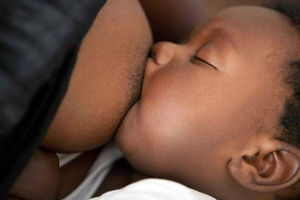
Glad man touching on his stomach and feeling good after looking at the pregnancy test of his wife.
Although not commonly discussed, some people find pleasure in adult breastfeeding. There are several reasons why one might want to explore this practice, and there are many myths surrounding it.
Also known as erotic breastfeeding, experts say not much is known about the benefits and dangers of the practice.
However, Dr Vincent Murwa, a general practitioner, says it is not inappropriate to breastfeed your partner or spouse if he expresses curiosity to try it out.
“I have never met a man who breast-feeds, but I have heard that some men do. However, they may simply be fascinated by the taste of breast milk or by the sight of a lactating breast. It may sound weird, but there is no harm,” says Dr Murwa.
However, he issues a stern warning if the woman has a baby who is still breastfeeding.
“If the woman is nurturing a young one, she should refrain from the act to avoid exposing the child to infections and dental diseases. The breast usually has pores that attract dirt, which can get into the child through the breast,” warns Dr Murwa.
He further points out a difference between occasional sipping and regular feeding.
“It becomes a concern if the baby is not getting enough breast milk.”
So why do adults want breast milk?
Several studies show that breast milk is generally used as a home remedy for certain illnesses. Similarly, children get benefits from their mother's breast milk, but there are no scientifically proven health benefits for adults who consume breast milk.
According to Dr Murwa, some do it because they have a fetish that involves breastfeeding. An article that was published in Time magazine said in worldwide Google searches, “my husband wants me to breastfeed him” is a more popular search term than “my husband wants to separate” and “my husband wants a baby” combined.
Dr Murwa says some men just want to know what breast milk tastes like. And since breast milk is typically creamy and sweet, they may even like the taste.
In addition, some women find breast stimulation more pleasurable during the postpartum period [the period after delivery], hence breastfeeding their partners.
“Sharing this intimate experience may be fulfilling for both parties and can strengthen your bond as a couple as long as there are no health risks involved,” says Dr Murwa.
No benefits
For women, several studies have shown that breastfeeding can help reduce blood loss after birth and reduce the risk of getting breast cancer and type 2 diabetes, but these benefits apply to infant feeding and have not yet been proven for adult breastfeeding.
Dr Murwa notes that although experts warn mothers not to breastfeed their partners, some still defy them and go ahead with it. This, he says, is based on the beliefs surrounding the act.
There is a belief that if your baby has a breast preference, left or right, or if one of your breasts does not produce as much milk as the other, your partner can help balance things out by feeding on the neglected side.
Others believe that allowing your partner to help you empty your breasts can reduce the risk of blocked milk ducts and engorgement.
Milk safety
On the issue of whether the milk is safe for an adult, Dr Murwa says it is as long as the milk comes from someone you know.
He warns, however, that HIV and other infectious diseases can be passed on through breast milk.
“Make sure that your partner doesn't bite your nipples, as this can cause small breaks in the skin, which can develop into a breast infection and possibly affect your ability to continue breastfeeding your baby, as well as spread infections,” he says.
He also warns that a breastfeeding mother is also at high risk of contracting a disease if she has sore breasts, tender nipples, a contagious or sexually transmitted disease, a contagious infection or virus, or if she is pregnant.











